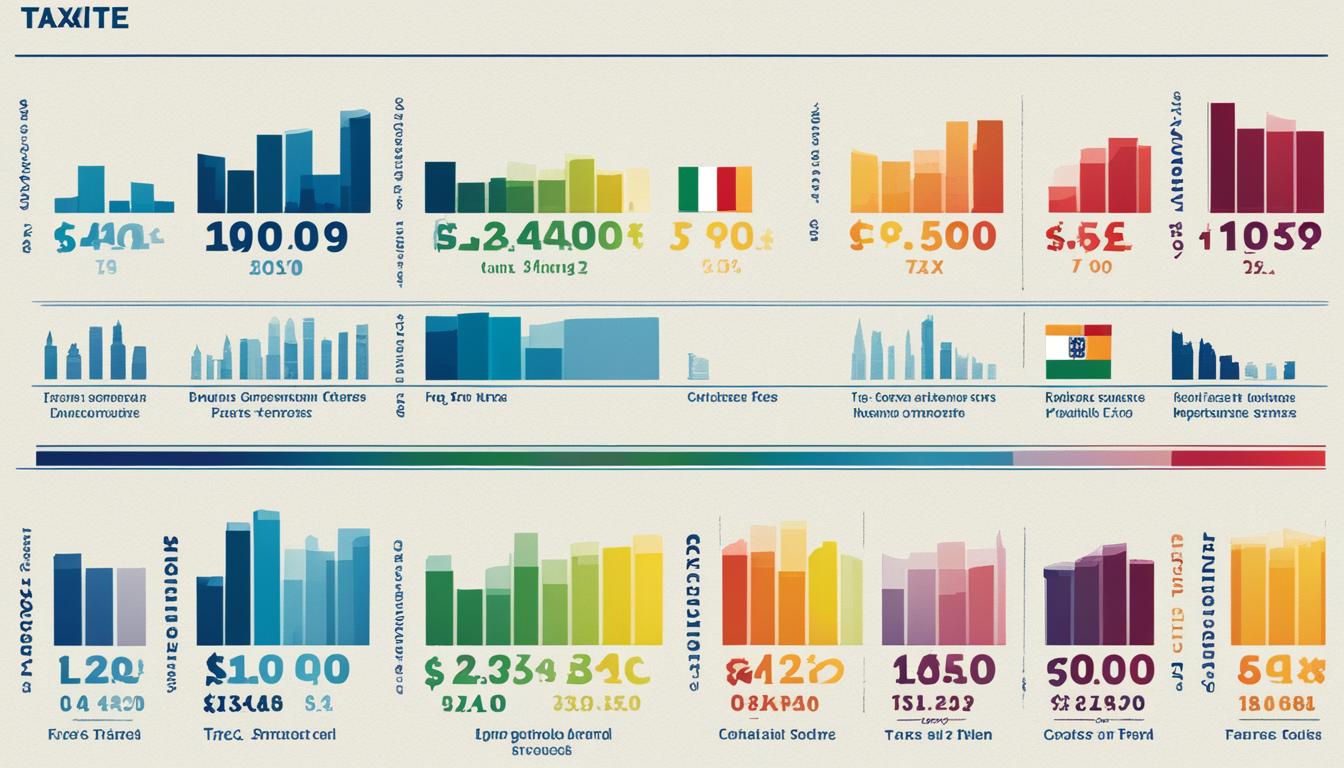Knowing about corporate tax rates in Europe is key for businesses that work across borders. This piece looks at the tax rates in Italy, Spain, France, and Portugal. It shows how these differences affect companies’ decisions on operations, investments, and finances. We’ll give insights to help with tax planning and understanding European tax rules.
Key Takeaways
- The corporate tax rates vary significantly across Italy, Spain, France, and Portugal.
- Tax comparison is essential for making informed business decisions.
- Understanding local regulations can enhance strategic planning.
- Incentives may exist for foreign investments in these countries.
- Current reforms can impact the corporate landscape moving forward.
- Being aware of tax residency rules is crucial for compliance.
Introduction to Corporate Tax Rates
Corporate tax is the part of a company’s profits given to the government as tax. It’s key for businesses to know about corporate tax rates to predict profits and manage costs. Knowing the importance of corporate taxation helps companies plan their taxes better, reducing their tax bills while following the law.
In Europe, corporate tax rates differ a lot, affecting how businesses work and invest. These differences can greatly change a company’s financial health. Companies in tough markets need to understand these differences to stay ahead and make the most of their tax strategies.
Understanding Corporate Taxation in Europe
Corporate taxation in Europe is complex, shaped by many factors. Each country has its own tax rules, affecting companies’ decisions to grow or work across borders. The mix of national and EU tax rules helps set fair tax rates.
The EU works to make taxes more consistent to prevent unfair competition. It aims to make taxes simpler and more predictable for businesses. This includes rules on transfer pricing, VAT, and anti-avoidance measures. These steps help ensure fair trade across borders.
Companies aiming to save on taxes must navigate many rules from local and EU laws. It’s a challenge to manage taxes while following all the rules. Knowing how corporate taxation works in Europe is key for success in a tough global market.
| Aspect | Importance | Example |
|---|---|---|
| Corporate Taxation Framework | Defines tax obligations for corporations | Country-specific tax rates |
| European Union Tax Regulations | Sets harmonised standards for member states | Transfer pricing regulations |
| Tax Harmonisation | Aims to reduce tax competition and complexity | Common VAT rules |
Overview of Corporate Tax Rates in Italy
In Italy, the corporate tax rate is 24%. This rate has changed over time due to tax reforms and business tax laws. These changes aim to make Italy more attractive to investors from around the world. It’s important for businesses thinking about setting up in Italy to understand these changes.
Current Tax Rate for Corporations
The 24% tax rate applies to all income of corporations in Italy. This rate makes Italy competitive with other European countries. Companies everywhere in Italy face the same tax rules, ensuring fairness for all.
Recent Changes and Reforms
Italy has made tax reforms to help small businesses and startups. These reforms include lower tax rates to boost growth and innovation. The government is committed to making Italy a better place for investments. EU rules have also shaped these tax changes, guiding Italy’s corporate tax policies.
| Category | Details |
|---|---|
| Current Corporate Tax Rate | 24% |
| Reform Focus | Support for startups and small businesses |
| Impact of EU Regulations | Influencing Italian tax reforms |
Overview of Corporate Tax Rates in Spain

Spain’s corporate tax scene is a mix of a standard national rate and regional variations. The main corporate tax rate is 25%, affecting most businesses. It’s key for companies looking to invest or expand here.
Current Tax Rate for Corporations
The Spanish corporate tax rate is a steady 25% for most companies. This makes Spain an attractive place for businesses. New companies can get a break with a 15% rate for their first two years, encouraging growth and new ideas.
Impact of Regional Regulations
Regional taxes play a big part in Spain’s corporate tax scene. Local governments offer tax breaks, exemptions, or credits to draw in investment. Companies need to understand these regional differences to manage their taxes well.
| Region | Corporate Tax Rate | Incentives |
|---|---|---|
| Andalusia | 25% | Tax credits for R&D |
| Catalonia | 25% | Investment deductions |
| Madrid | 25% | Lower rates for new companies |
| Valencia | 25% | Employment incentives |
Overview of Corporate Tax Rates in France
Corporate taxation in France has changed a lot in recent years. The tax rate for companies is going down. This change aims to make doing business in France more appealing and to draw in foreign investment. By 2022, the tax rate will be 25%, making France more in line with other European countries.
Current Tax Rate for Corporations
The current tax rate for most companies in France is 26.5%. However, smaller companies can pay a lower rate of 15% on profits up to €38,120. This shows the government’s effort to create a fair and competitive tax system for businesses.
Comparative Tax Benefits
Companies in France get special tax benefits, especially for research and development. They can get up to 30% of their R&D costs back through tax credits. This makes France a great place for innovation, better than many other countries nearby.
Investing in France means getting a good corporate tax rate and many other benefits. These benefits help with growth and innovation. Companies thinking of expanding can use these benefits to make their operations stronger.
Overview of Corporate Tax Rates in Portugal
Portugal is a top choice for businesses, thanks to its low corporate tax rate and incentives for foreign investment. The corporate tax rate is 21%, matching the European Union average. This makes Portugal a stable place for businesses to grow.
Current Tax Rate for Corporations
Most companies in Portugal pay a 21% corporate tax rate. But, smaller businesses get a break with a 17% rate on the first €25,000 they make. This helps local businesses grow and supports startups.
Incentives for Foreign Investments
Portugal offers tax breaks to draw in foreign investment. These include special tax rules for international companies and extra perks for sectors like tech and renewable energy. Companies that invest in research and development can get big tax cuts. The Non-Habitual Residents (NHR) scheme also offers tax breaks to attract foreign talent.
| Incentive Type | Description | Eligibility Criteria |
|---|---|---|
| Reduced Corporate Rate | 17% on income up to €25,000 | Applicable for small businesses |
| R&D Tax Credits | Generous deductions for R&D activities | Must substantiate R&D expenditures |
| Non-Habitual Resident Scheme | Tax exemptions on specific foreign income | Individuals relocating to Portugal |
| Sector-Specific Incentives | Attractive benefits for specific industries | Must target approved sectors like tech |
Compare the Corporate tax rates in Italy, Spain, France, and Portugal
Looking at corporate tax rates in Italy, Spain, France, and Portugal shows big differences. These differences can greatly affect business decisions. Companies in these countries need to know the tax rates and rules that apply to them.
| Country | Standard Corporate Tax Rate | Special Reductions |
|---|---|---|
| Italy | 24% | Reduced rates for small businesses |
| Spain | 25% | Lower rates for new companies |
| France | 25% | Support for tech startups |
| Portugal | 21% | Incentives for foreign investment |
From this comparison, we see different approaches to corporate taxes. Italy has a flat rate but helps small businesses with special incentives. Spain also helps start-ups grow quickly. France supports tech innovation with tax cuts. Portugal aims to draw foreign investment with attractive offers.
Knowing these details can help companies choose the best place for their business.
Factors Influencing Corporate Tax Rates
Corporate taxation is shaped by many factors that differ greatly between countries. These include economic conditions, government policies, and how competitive a country is in the global market. It’s vital for businesses to understand these factors. They help with planning finances and making investment choices.
Economic performance is a key factor. Countries with strong economies can offer lower tax rates to draw in foreign investments. On the other hand, those with weak economies might raise taxes to keep public services running.
Government policies also have a big impact. Changes in laws can quickly change corporate tax rates. This reflects changes in politics or economic plans. Some countries might offer tax breaks to boost growth, while others might increase taxes for stability.
International competitiveness is another important factor. Countries want to stand out on the world stage. Tax rates can affect where multinational companies choose to operate and invest. This pushes them towards countries with more attractive tax conditions.
To sum up, economic conditions, government policies, and international competitiveness shape corporate tax rates. Businesses need to understand these factors well. This helps them make the best tax strategies and work more efficiently across borders.
Economic Implications of Tax Rates in Southern Europe
Corporate tax rates in Southern Europe have big effects on the economy. They affect growth, foreign investment, and how competitive regions are. Countries like Italy, Spain, France, and Portugal have different tax systems. This leads to varied effects on corporate taxes across the region.
Looking at these tax policies shows trends that UK investors might find interesting. Lower corporate tax rates draw in foreign investors looking for better financial conditions. On the other hand, higher rates might keep investors away, slowing down the economy and causing big problems later.
Experts think Southern Europe’s economy could change because of these tax policies. So, UK businesses planning to invest there need to think about the tax environment. Understanding the tax landscape is key to staying competitive.
| Country | Current Corporate Tax Rate | FDI Attraction (2019-2021) | GDP Growth (%) (2022-2023) |
|---|---|---|---|
| Italy | 24% | Stable | 1.5% |
| Spain | 25% | Increasing | 5.2% |
| France | 32.02% | Decreasing | 3.0% |
| Portugal | 21% | Increasing | 4.0% |
In summary, corporate tax rates in Southern Europe have a complex effect on investment and growth. It’s vital for investors to understand these factors to make the best decisions in this varied economic landscape.
Understanding Tax Residency and Its Effects
Tax residency is key for businesses working across borders. It affects their tax duties a lot. Countries have different rules for tax residency, changing how companies are taxed. This part will look at how Italy, Spain, France, and Portugal decide if a company is tax resident. It’s important for knowing how to follow the rules and what taxes you might owe.
Definition of Tax Residency
What makes a company tax resident can change, but it usually means seeing if a corporation is seen as resident for tax. Each country has its own rules. These look at where the company is registered, where its main management is, and where it does its business. Knowing these rules helps a company figure out its tax status and what taxes it must pay.
Comparative Analysis of Residency Rules
Here’s a look at how Italy, Spain, France, and Portugal decide if a company is tax resident. We’ll see the main differences and similarities in how they handle corporate residency.
| Country | Criteria for Tax Residency | Corporate Taxation Implications |
|---|---|---|
| Italy | Company is considered resident if registered in Italy or managed from Italy. | Subject to Italian corporate tax on worldwide income. |
| Spain | Tax residency for companies if the majority of board meetings occur in Spain or the registered office is located there. | Taxed on worldwide income for resident companies. |
| France | Defined as resident if the company has a permanent establishment or management in France. | Also taxed on worldwide income with specific exemptions available. |
| Portugal | A company is resident if its head office or effective management is situated in Portugal. | Liable for tax on worldwide income, with additional incentives for certain foreign investments. |
Tax Compliance and Administration in Italy
For companies in Italy, knowing about tax rules is key to good financial management. They need to keep detailed records, including financial statements and legal forms. These must follow local laws that affect businesses.
It’s important to file tax returns on time to avoid fines. Companies must know the deadlines, which are set throughout the year. If they miss these, they could face big fines and extra charges on taxes owed. Italy’s tax office helps by offering advice and online filing options.
- Important documents include:
- Financial Statements
- Corporate Tax Returns
- Invoice Records
Regular audits check if companies follow tax laws. Companies must keep accurate records and document all deals. Not doing this can lead to big fines and more tax checks.
Understanding tax rules in Italy helps UK businesses deal with the tax system. It keeps them in good standing with tax authorities.
Tax Compliance and Administration in Spain

For corporations, understanding tax rules in Spain is key. They must follow many rules to stay on track. This includes filing tax returns on time, paying taxes, and keeping financial records right.
Companies in Spain might find it hard because of language and different ways of doing things. This can make it tough to know what taxes they owe and how to file. For example, foreign firms might find the Spanish tax system complex, with rules on VAT and income tax.
- Working with local tax experts to understand the rules.
- Using accounting software that meets Spanish standards.
- Training staff well on tax matters.
These steps can help companies meet Spanish tax rules better. This lowers the risk of fines and makes running the business easier in Spain.
Tax Compliance and Administration in France
In France, following tax rules is key for companies. It’s important for firms to understand French tax rules. They must file the right documents that show their finances for the year.
Companies must send in tax returns every year. These show their income and any deductions they can claim. Making sure to file on time helps avoid fines and keeps them in line with tax laws. Key tasks include:
- Identifying what income is taxed
- Working out how much tax they owe
- Sending in the right forms to the French Tax Administration
Good tax practices in France mean keeping financial records right and talking to tax experts. This helps businesses deal with tax issues well.
Things to watch out for include not keeping up with law changes and missing out on tax breaks. Knowing these helps companies make the most of their taxes and stay legal.
| Tax Compliance Obligation | Description | Deadline |
|---|---|---|
| Annual Tax Return | Provide detailed report of income and deductions | Within three months after the fiscal year-end |
| Quarterly Advance Payments | Pay a portion of estimated tax liability | 15th of the last month of each quarter |
| Documentation Retention | Keep records of all transactions for scrutiny | At least six years |
Tax Compliance and Administration in Portugal
Tax compliance in Portugal is crucial for businesses. The tax system is a mix of simple and complex rules. It’s important to understand these rules to manage taxes well.
- Register with the tax authorities and get a tax ID number.
- Keep accurate accounting records as required by law.
- File tax returns on time to avoid fines.
- Know and use the right VAT rates for products and services.
- Check tax duties often to keep up with law changes.
There are challenges with the Portuguese tax system. Companies might find the rules complex, especially if they vary by region or sector. Not knowing about law changes can make it hard to follow the rules, affecting the business.
Getting help from local experts can make tax compliance easier. Accountants who know the Portuguese tax system well can help. They offer insights and make sure companies follow the law and use their taxes wisely.
In short, businesses in Portugal should take a proactive stance on tax compliance. Knowing the local rules and getting professional advice can make it easier. This helps with success in the long run.
| Tax Compliance Requirement | Details |
|---|---|
| Registration | Get a tax identification number from the tax authorities. |
| Accounting Records | Keep accurate financial records as per legal standards. |
| Filing Tax Returns | Submit tax returns on time to avoid fines. |
| VAT Compliance | Apply relevant VAT rates to goods and services. |
| Regular Review | Continuously assess tax obligations for changes. |
Future Trends in Corporate Taxation
The corporate tax scene in Europe is set for big changes. These changes come from new laws, more digital use, and shifting business needs. Tax trends show a move towards more EU unity, making things simpler and boosting competitiveness.
Digital taxes are becoming more common, tackling the digital economy’s challenges. European reforms aim to make big companies pay their fair share. This change meets public concerns and makes tax systems stronger.
Businesses must get ready for these changes with smart strategies. Keeping up with European tax reforms and adjusting operations will help stay competitive in this fast-changing world.
| Trend | Description | Impact |
|---|---|---|
| Digital Taxation | Implementing taxes on digital services provided by multinational corporations. | Ensures fair distribution of tax revenues among countries. |
| Increased Harmonisation | Standardising corporate tax rates and regulations across EU member states. | Simplifies compliance for businesses and reduces tax avoidance opportunities. |
| Environmentally Sustainable Taxation | Encouraging businesses to adopt sustainable practices through tax incentives. | Promotes environmental responsibility among corporations. |
Impacts of the EU’s Corporate Tax Reforms

The EU has recently made changes to corporate tax laws to make things fairer across the board. These reforms aim to stop companies from avoiding taxes unfairly. This change is big news for businesses as they need to follow new rules to stay on the right side of the law.
One of the main changes is setting a minimum tax rate and stopping companies from moving profits around to avoid taxes. This makes things more transparent and fair for everyone. Companies will now have to rethink their tax plans, especially if they work across borders.
Here’s a quick look at how these reforms might affect businesses:
- Increased compliance costs due to more complex regulatory requirements.
- Enhanced scrutiny from tax authorities, leading to potential audits and reviews.
- Altered profit allocation strategies, which may affect financial performance.
- A shift in investment decisions as firms assess tax implications on future projects.
Companies need to adapt quickly to these new rules. Those that get ahead of the game can find new chances in a fairer tax world.
Final Thoughts on Corporate Tax Rates in Southern Europe
We’ve looked at corporate tax rates in Southern Europe, focusing on Italy, Spain, France, and Portugal. Each country has its own tax rules and rates, which affect investment choices. For example, Italy has made changes to boost competitiveness. Spain’s tax rules vary by region, offering both benefits and challenges.
France and Portugal offer tax incentives that can draw foreign investment. Portugal gives tax breaks to new companies, while Spain has special rates for certain sectors. This shows how each country tries to attract international businesses with different tax strategies.
For UK businesses thinking about expanding or investing here, knowing about corporate tax rates is key. Understanding the differences in tax laws and incentives across Southern Europe helps companies make better decisions. This knowledge lets them move into these markets more smoothly.
FAQ
What are the corporate tax rates in Italy, Spain, France, and Portugal?
Italy has a corporate tax rate of 24%. Spain’s rate is 25%. France is lowering its rate to 25%. Portugal’s rate is 21%.
How do regional regulations affect corporate tax rates in Spain?
In Spain, regional rules can change corporate tax rates. Autonomous communities offer incentives or benefits. This leads to different tax rates for businesses in those areas.
What are the implications of recent tax reforms in Italy?
Italy has recently cut tax rates for small businesses and startups. These changes aim to draw more foreign investment and improve the tax environment for companies.
How does France’s tax credit system support businesses?
France gives tax credits for research and development (R&D) work. This helps companies that innovate in the country.
What incentives does Portugal provide to attract foreign investments?
Portugal offers lower tax rates for small businesses and special tax rules for international companies. This makes it a good place for foreign investment.
What factors influence corporate tax rates across different countries?
Corporate tax rates are affected by a country’s economy, government policies, and need to stay competitive. They also change with the market.
What are the compliance requirements for corporations in Italy?
In Italy, corporations must follow certain rules. This includes filing tax returns on time and being ready for audits.
How can businesses navigate tax compliance in Spain?
To follow tax laws in Spain, businesses should know the local rules. They should also tackle challenges like language barriers and use good compliance strategies.
What should businesses be aware of regarding tax residency rules?
Knowing about tax residency rules is key. These rules affect a company’s tax duties and differ in Italy, Spain, France, and Portugal. It’s important for businesses to understand them to avoid surprises.
What future trends are expected in corporate taxation across Europe?
We might see more EU countries agreeing on tax rules, digital taxes, and reforms to stop tax avoidance in the future.









